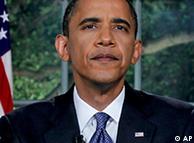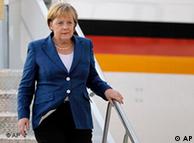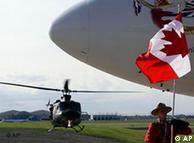ECONOMY | 25.06.2010
World summit gets underway as split between EU and US intensifies
The meeting of eight leading economies got underway in Toronto on Friday amid growing tensions between Europe and the US on how best to fend off a second global recession. Some European states have launched sweeping budget cuts in recent weeks in a bid to convince markets, and their own voters, of their stability. But US officials are concerned that too much zeal in making cuts could hamper growth later.
 US President Obama is against too harsh spending cuts
US President Obama is against too harsh spending cuts
US President Barack Obama insists that national economic policies must focus on bolstering the recovery, rather than immediately tackling deficits.
"This weekend in Toronto I hope we can build on this progress by coordinating our efforts to promote economic growth, to pursue financial reform, and to strengthen the global economy," Obama said at the White House on Friday.
Germany to defend its austerity measures
Germany set the stage for a rancorous opening of the summit by launching an aggressive defense of their new austerity measures.
"Germany has contributed a lot to overcoming the global and economic crisis in the last couple of years," Chancellor Angela Merkel said in a Wall Street Journal interview.
Germany has announced major spending cuts and has pushed for similar measures throughout Europe, in hope of avoiding concerns within financial markets about the solvency of such weaker European Union members as Greece, Spain and Portugal.
Berlin has support in Europe
 Germany's Angela Merkel arrived amid the tensions
Germany's Angela Merkel arrived amid the tensions
Other EU countries, like Britain, are following the German approach. British Prime Minister David Cameron arrived at his first major international summit days after laying out a budget aimed at tackling Britain's record deficit. Cameron argued that a failure to reduce the deficit would pose an even bigger threat to the recovery.
"There must be the flexibility for countries to act, taking account of their own national circumstances. But I believe we must each start by setting out plans for getting our national finances under control," Cameron wrote in an article for Canadian daily the Globe and Mail.
However some, including France and the US, object to Britain and Germany's swinging cuts. According to critics, measures such as pay freezes will thwart demand for products from other struggling European economies.
Hosts Canada back the US
Canadian Prime Minister Stephen Harper said in a letter last week to G20 leaders that major Western countries must "send a clear message" about their long-term plans to sharply reduce deficits.
But he also warned of lurking danger. "The fiscal stimulus we have implemented was necessary to protect our economies from a much worse crisis," he wrote.
Merkel arrived in Canada on Friday, and flew to Huntsville, the resort where the summit opened at midday local time. The topics up for discussion aside from pressing questions over economic policy include the situation in the Middle East, particularly in Gaza, and the conflict surrounding the Iranian nuclear program as well as the development of Afghanistan.
The economic debate is likely to come to a head on Saturday and Sunday, when an additional 11 countries will join the talks, plus the European Union, as the G8 turns into the G20 summit. Together, the G20 nations make up two thirds of the world population, and represent about 85 percent of global economic power.
Merkel wants to push for a worldwide bank levy this weekend, which would put the burden of costs of future financial crises on the banks themselves. However, the host, Canada, is against such a plan, partly because Canadian banks have emerged relatively unscathed from the economic crisis.
Author: Joanna Impey (AFP/dpa/Reuters)
Editor: Andreas Illmer


No comments:
Post a Comment